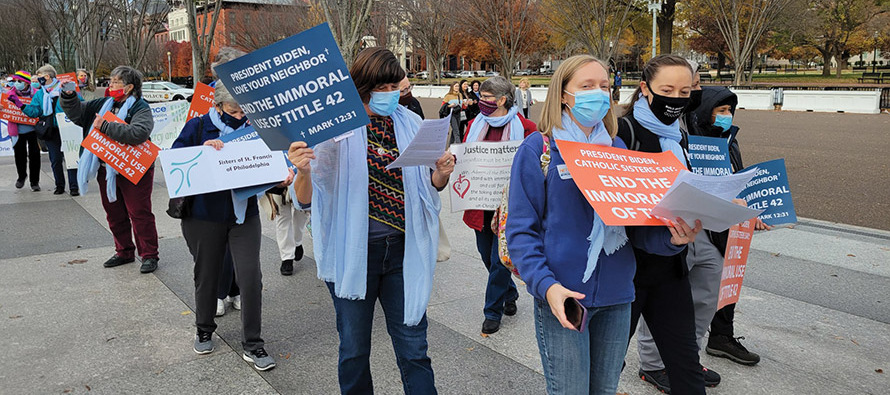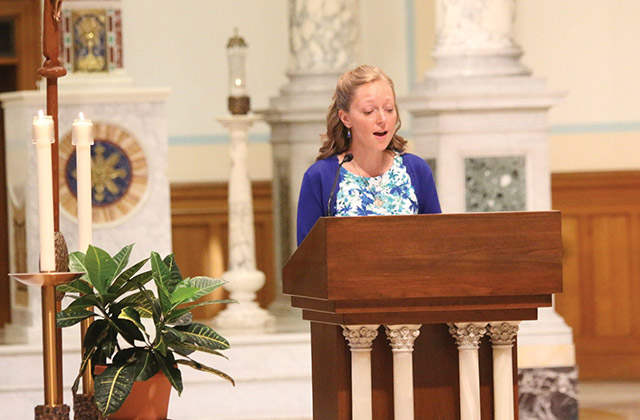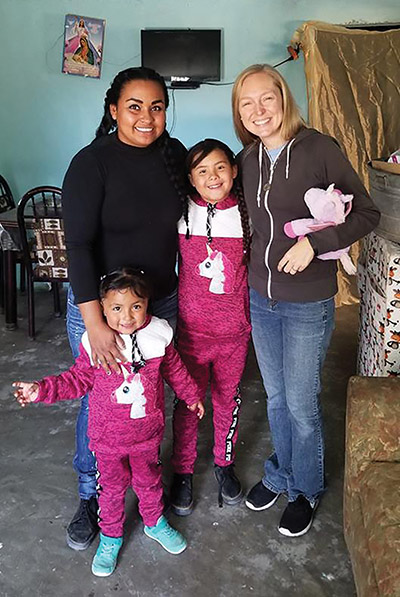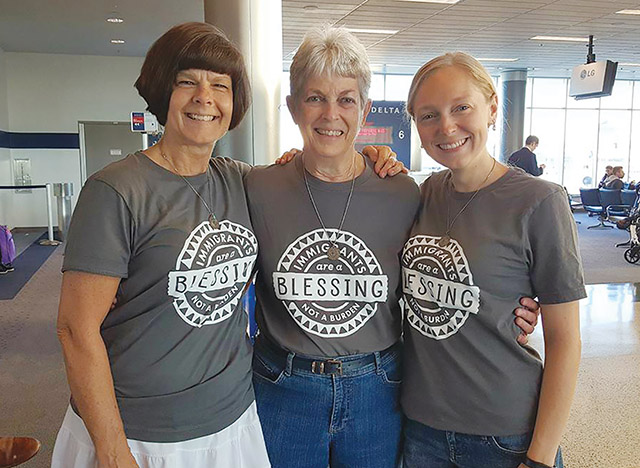My millennial response to a perennial call

“I had been longing for something radical, meaningful, communal,” Sister Tracy Kemme, S.C. says about why she entered religious life. Here, she walks with other Catholic sisters in Washington, D.C., at a demonstration supporting immigration reform. (Photo courtesy of Sisters of Charity of Cincinnati)
I FIRST THOUGHT ABOUT becoming a sister at age 22, while I was an international volunteer with Rostro de Cristo, near Guayaquil, Ecuador. For two years, I lived in a faith community with other young adults, volunteered with Ecuadorian outreach organizations, grew in relationship with my Ecuadorian neighbors, and learned to see the world, especially my faith, with new eyes.
Early during the first year, on a weekend beach retreat, I was staring out into the vast ocean, weighing many swirling concerns, when five little words popped into my consciousness: “You should be a nun.” The thought was startling—disturbing, even. Where did it come from? I had never met a nun anywhere close to my age, and besides, I’d always imagined myself getting married and having a family! I tried to shrug off the idea, but it persisted, arising in prayer and surprising me in everyday encounters.
Eventually, I realized I needed help sifting through my seemingly crazy thoughts. Providentially, Sister Macarena, a trained spiritual director from Spain, moved in down the street. Being a ’90s girl, I loved her name—and I grew to love her as she guided me through Ignatian-style discernment during weekly sessions in her community’s little house chapel. Maca helped me to look upon my life in the light of faith and explore my deepest desires without fear. I found I longed for a life centered on a deep relationship with God and poured out for the good of others.
In Ecuador, I had touched into the deep pain and injustice that face so many in our world, and I’d been evangelized by the “poor.” I wanted to spend my life walking alongside those people and contributing to the great work of changing the world for the better—the work of the gospel, of carrying on the mission of Jesus. To my dismay, I realized that my life as a volunteer was similar to contemporary apostolic religious life—and, despite difficulties, it brought me profound joy and deeper meaning than I’d ever before experienced.

Sisters in their natural habitat
When I left Ecuador, I knew I had to continue discerning. I became a lay volunteer associate with the Sisters of Charity of Cincinnati at their discernment house near El Paso, Texas. The sisters, Carol, Janet, and Peggy, had hosted me when I came to the border for senior thesis research in 2007. Now, I had come to share in their life and ministry.
I often joke that moving in with them felt like a wildlife show, “Observe the sisters in their natural habitat….” Lo and behold, I discovered that sisters brushed their teeth, got oil changes, texted, ate popcorn, and got on each other’s nerves. At the same time, woven in with this ordinariness was something quite remarkable, something like what I had experienced in Ecuador but firmer and deeper, because this was for life.
We began early each morning with prayer together and then spent the day in ministry—in education, healthcare, border outreach, young adult ministry, parish ministry, social justice activism, writing, vocation ministry, and more, on both sides of the U.S.-Mexico border. For these sisters, religious life was not a refuge from the world, but a devoted, loving integration into it.

In the evenings, we took turns cooking and shared long meals together. On the weekends, we experienced beautiful liturgies in the house chapel and in local parishes, and we held monthly communal reflection days. And we were goofy together, played card games, gardened, took walks, watched Call the Midwife, and drank wine around the fire pit.
As much as my heart resisted, I was falling in love with religious life. I had been longing for something radical, meaningful, and communal—and I was coming to realize that this could be it.
Love and total freedom
However, in a real-life plot twist, I also began falling in love with a person at the same time. Steve and I grew close while volunteering together in Ecuador, but it was over phone calls between Boston and the El Paso convent that we realized our bond was deeper than friendship.
When I finally spilled the new romantic development to the sisters in the house, they laughed. “Of course you’re falling in love! You’re 24.” Their tender understanding touched me. They weren’t trying to force anything; they truly wanted me to discover God’s call.
After months of frequent spiritual direction but no clarity, I felt like I needed to go to Boston and really date Steve. When I worked up the courage to tell the sisters, they laughed again. “Yes, we knew, but we wanted to let you get there on your own.” They sent me off with love and total freedom.
Long story short, my time in Boston revealed that although I loved Steve with all my heart, the call to religious life just wouldn’t go away. It didn’t make sense to me. Steve was everything I would have dreamed of in a husband and more. Our marriage could have been radical, meaningful, mission-centered, and rooted firmly in our shared Catholic faith.
But, no matter how much I willed it, I couldn’t imagine myself married down the road. Although I’d once dreamed of it, I couldn’t readily see myself as a mother. Somehow, it felt like a door was closing on that path, and religious life felt like a big blue sky opening up. Steve told me that I would be a beautiful sister. Ironically, his strong faith helped me claim the call that would take me away from him.

A sturdy call
I went back to the border, grieving a real loss, but, with time, my heart began to revive and burn with purpose. I remembered why I’d felt so powerfully drawn to religious life. And this time, the call felt sturdy. I had learned that religious life wasn’t magic; it wouldn’t save me from loneliness, anxiety, or self-scrutiny. It wasn’t perfect, and living with women from different generations and backgrounds was challenging and even painful at times. It wasn’t an escape; ministry with those who are suffering can be exhausting and heartbreaking.
But in its imperfection and my own, there was a sense that this was the life to which God was inviting me. It would involve some sacrifice, yes, but what life worth living doesn’t? More than anything, it was about joy, love, and freedom. When God calls, it is to fullness of life.
Reprinted with permission from the August 2, 2019 edition of Global Sisters Report, globalsistersreport.org.
Related articles: VocationNetwork.org, “Sister Maggie has a mission” and “A zigzagging road to the convent.”
Tags
Related
- Seeing God in a child’s smile: Profile of Sister Marie Elizabeth Jerry, S.S.F.
- Bringing sacred healing to hurting communities
- Sisters help Uvalde move from trauma to trust
- Camaraderie at its best: Profile of Sister Kristine Fernandes, C.S.J.
- Goodbye L.A., hello heartland: Profile of Sister Jessica Vitente, S.P.
- A zigzagging road to the convent
- Sister Maggie has a mission
- Living simply, centered on prayer
- Sisterhood is different from singlehood
- Meeting a real nun was a game-changer: Profile of Sister Liz McGill, I.H.M. Read More
Most Viewed
- Find your spirituality type quiz
- FAQs: Frequently asked questions about vocations
- Celibacy quiz: Can you live a celibate life?
- Resources for older discerners or those with physical and developmental differences
- About Vocation Network and VISION Guide


